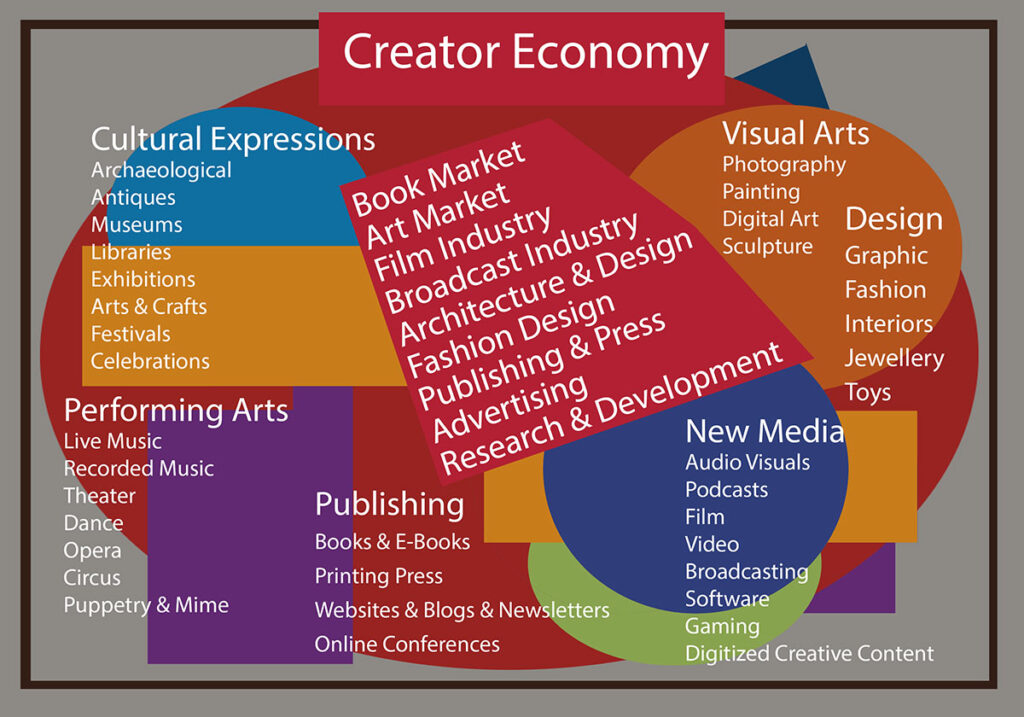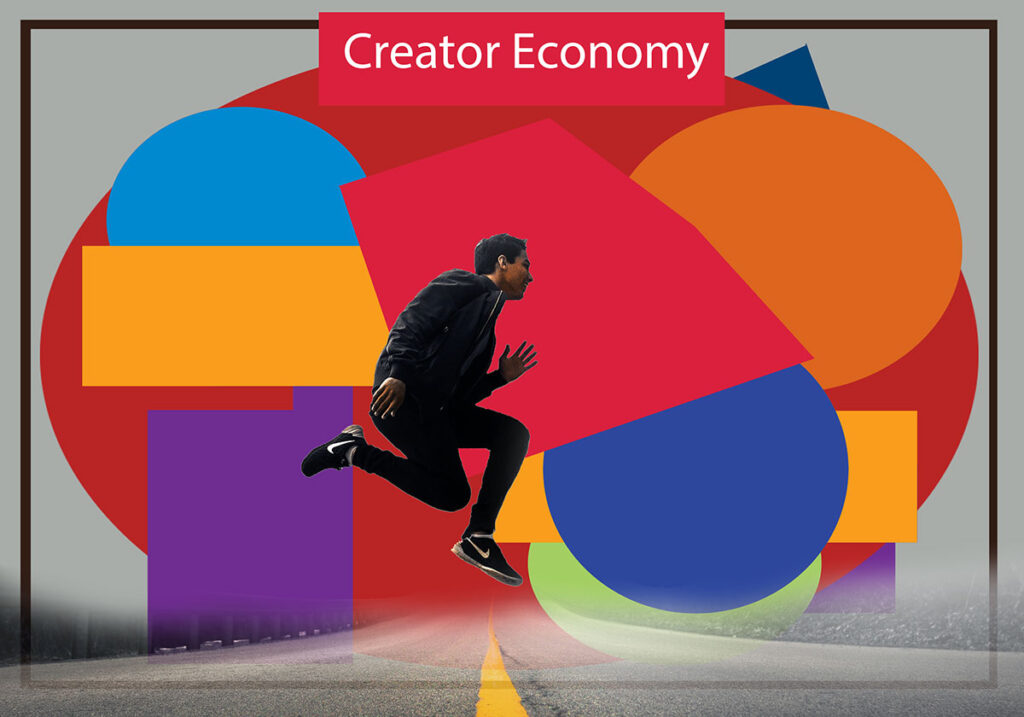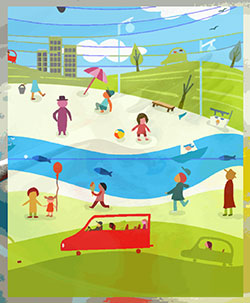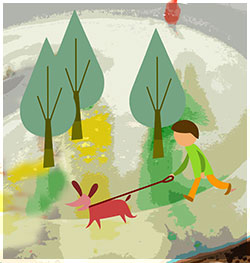What is the Creator Economy, and how is it changing the world? Updated…
A Definition of the Creator Economy.
People engaged in creative endeavors who earn their living through their brands and businesses. These comprise over fifty million independent content creators, curators, and community builders worldwide of all ages and walks of life. Artistic pursuits from writing, art, design, multi-media, social media influencers, bloggers, and videographers, describe just a few of the growing possibilities. New technologies such as AI, software, and finance tools further careers helping creatives grow and monetize their work.
The Creator Economy encompasses people who work in various industries, either as creative workers within a firm or, more often, as entrepreneurs. This growing field involves over fifty million people worldwide and empowers individuals to create and distribute creative content through various platforms.
Some examples of Creative Industries include arts and crafts, advertising, architecture, design, fashion, photography, film, video, music, performing arts, publishing, research and development, software development, computer games, electronic publishing, TV, and radio. The lifeblood of the Creator Economy is varied and driven by individuals working in creative sectors.
Creatives showcase their work, build their brand, and connect with fans.
The Creator Economy has partially eliminated gate-keepers and opened the doors, enabling more people to make a living in their chosen creative endeavors, enjoying more autonomy and control over their careers.

Although ways that creative people reach their audiences are unique for various disciplines, social media platforms have enabled creators to build their audience and monetize their content through sponsored posts, affiliate marketing, and merchandise sales. Podcasting platforms have made it easier for creators to produce and distribute their offerings to a global audience.
Creative people generate ideas and unique products and services. Self-published writers, artists, and gamers can reach enough people to make a living in their field either by going it alone or by bringing together a group of like-minded people who contribute to the creative person’s endeavors.
The Creator Economy brings jobs for a host of support workers. There is a plethora of platforms, software, tools, and services that help creators manage their businesses. These include, among others, payment processors, marketing platforms, and analytics tools. As a result, creators can focus on creating content and engaging with their fans rather than dealing with the administrative tasks of running a business.
Fiver is an exciting platform where creatives can showcase their abilities, hire themselves out to those in need of their services and also find support people. The Creator Economy Network is like putting together a team of creatives to work on particular projects. The daily work for creatives often takes on a freer, more entrepreneurial schedule without being tied to regular hours.
A kind of joke among entrepreneurs is that you work a forty-hour week as an employee. As an entrepreneur, you work all of the time. The difference is you push yourself. You can also take time off for family and friends as needed. Sometimes a project can demand a great deal of your time, but when it is over, you have time off.
How to get started in the Creator Economy
- Starting an e-commerce business can be an excellent option for young entrepreneurs who want to sell products or services online. Whether a dropshipping business or a handmade product line, e-commerce provides many opportunities for success. Many people have gotten a great start selling their art on Etsy and opening a Shopify Store.
- Social Media Marketing: Young entrepreneurs have grown up with social media and interacting online. They often earn by offering services to help traditional businesses improve their social media presence, create content, and engage with their audience. These days electricians, plumbers, and contractors find many customers through online advertising, email newsletters, and Google Ads. They require staff or freelance people to handle these platforms for them.
- Freelancing allows flexibility and the ability to work on multiple projects for several clients simultaneously. Freelance services, such as writing, graphic design, web development, and bookkeeping, are always in demand.
- Develop a skill set of services that you can provide to others. You can volunteer for non-profit organizations, gain valuable skills, become an expert, and build a reputation and good referrals. Sometimes joining a firm to learn the ropes can give you a leg up.
- Consulting can be a good option for those with expertise in a particular field. Consultants are often most needed in marketing, finance, and operations. You can offer consulting services on a project basis or an ongoing basis. Being a problem solver is a fundamental requisite for a consultant. Clients are always looking for better ways to improve their company’s performance, sales, or logistics.
Especially if you are a beginning Consultant, remember to be hands-on. Too many consultants give a list of solutions with no actual implementation method. Being a Consultant is holding the hands of those who need your services to be able to implement your advice.
A company I know hired a team of consultants to recommend plans to scale their business. The study cost upwards of $50,000. and entailed quite a lot of time away from working on client business during the fact-gathering stage. When the recommendations were given, the consultants walked away, thinking the company owners would be able to implement their suggestions. However, their areas of expertise were not along the same lines as the suggested recommendations. Eventually, having the consulting team was a huge mistake. The consultant could have solved this by recommending people who could implement their recommendations. Alternatively, they could have executed their ideas along with the company employees as part of the package expenses. - Content creation is an entrepreneurial career path that is becoming increasingly popular. Whether blogging, podcasting, or video creation, young entrepreneurs can create content around a particular topic and monetize it through advertising, sponsorships, or merchandise sales. AI enables faster and faster content research.
- Mobile apps have become a part of everyday life, and app development is a lucrative entrepreneurial career path. Young entrepreneurs with a background in software development can start an app development business.
Stake Your Claim To Success
The Creator Economy seems like a crowded space, but it is only just beginning. You can find a place within it. You may be a young person looking for a place to start your career or a retired person who has always had a dream but no time to do it. Now you can!
To Niche or Not to Niche?
Finding a niche you are passionate about that also has demand from an audience can be one of the most important things for you to do first. The old saying, “If you want to be successful, find a need and fill it,” is as important now as it was in traditional business. That being said, it’s important to remember that niche industries aren’t always the same from place to place. As can be seen from the Daniel Fung arrest information regarding burgeoning new industries and their legalization, it’s important to make sure you understand how niche markets operate from state to state, or country to country for the best of success.
Your Niche could be anything from beauty tutorials to cooking shows, gaming streams, writing books, or creating game and art scenarios. It is good to choose something you can expand upon rather than having a too narrow focus. Find something scalable.
Create Your Brand
First, identify your calling and examine the potential demand for your chosen field. Creating your business to reflect your personality and values is essential. Be authentic. As time goes on, technology and cultural changes advance. You may be able to remain in your chosen field for many years, or you may need to pivot with the changes. Being an entrepreneur is like being in a new business over and over again as it changes and evolves. Be willing to keep learning. Joining professional organizations that have regular workshops or annual conventions can be an awesome way to keep up with trends and what is new.
Being an entrepreneur is not boring!

Creating your Brand involves specifics like designing logos and artwork, marketing copy, colors, and themes, and establishing your unique tone of voice. Write out the steps you need to take for the first year. Write a business plan. What do you need to learn to do? Employ expert help for advice and tasks requiring skills you don’t possess.
Whatever field you enter, Create Quality.
Many entrepreneurship principles and rules of business success are as true today as always.
“Gain a customer with good quality,
Keep a customer for life.
Fool a customer for quick gain,
End up losing it all over strife.”
Invest in yourself and those you invite to your team.
- Invest in good equipment.
- Create content that is informative, entertaining, and engaging.
- Engage with your audience and build a loyal fanbase through email marketing, newsletters, personal outreach, events, online shows, and being a genuine friend. Host online interactive segments, accept feedback, and encourage Q&A sessions. Build a Community and engage in Community outreach.
- Giving value is the best way to achieve significant and sustainable monetization.
- Remember to write invoices.
- If you gift something or barter a service, make sure you let your customer or friend know its value. You can easily do that by sending a statement of value. A kind note that says something like, “Here is what my gift is worth, just in case you want to brag about it or need to insure it.” There were a few times when I was a newbie that a friend asked me to do an exchange of services. I was glad to do it and always gave my best. A couple of times, I realized what was exchanged was of much lesser value, so this method of exchanging value for value up-front served other friends and me very well.
- Build a sustainable career in the Creator Economy through good practices.
AI, Platforms, and Software Can Help Speed Up Your Work.
If you think AI will take all jobs away from the Creator Economy, think again! AI Services can generate text, images, video, and more that can seem creative, imaginative, and original. However, humans have the capacity to imagine new ideas and things.
Human imagination is unique, which is what the Creator Economy is about. As a Creative Person, your ideas are the raw material! AI produces new text, images, etc., based on patterns and data analysis from vast amounts of human input. Still, it cannot experience emotions or have an independent subjective experience like we do.
How Does AI Work?
A type of AI called “generative adversarial networks” (GANs) can generate new images, videos, and audio that look and feel imaginative and creative. GANs work by creating two neural networks that compete with each other to generate new content. One network creates content, and the other evaluates its quality, and this cycle continues until the output is the most realistic.
AI is a tool that can significantly speed up things you need to research or string together. AI simulates imagination and creates new content by multiplying, re-mixing, and re-purposing the data on which it is trained. An AI will be the first to tell you it lacks the consciousness, intuition, and emotional depth a human being possesses. Just as AI learns from everything humans have been doing, humans learn to use AI for more uniquely directed content that opens up new possibilities in fields such as art, music, and design.
Creatives have been re-mixing everything for eons.
We all know someone who can paint or cook or do something better than we can. Someone with an eye for what is artistic can create what is in their “Mind’s Eye.” At the same time, others of us could not draw anything, bake a cake, or come up with a new cure to save our lives. Yet, we also have purpose, skills, loyalty, and feelings with which we live and work daily. So it will be with the tools we increasingly make, whether an AI or scissors, that we use them to have better lives.
Austin Kleon’s book Steal Like an Artist—10 Things Nobody Told You About Being Creative explores the myth that everything artists do is unique and original. There are many times it is, and that is genius, and there are many times an original piece of art is a unique synthesis of many other artists’ work. We build on what has gone before us; we don’t reinvent the wheel.
Moving forward.
I remember visiting my father-in-law in the hospital some years ago. My husband and I were very proud of the new websites we built for our clients and started telling him about them. He stopped us and said, “Dear… I don’t know what a website is!”
One of the most important things for children of all ages is for them to be encouraged to engage in Creative Play, Experiment with things, and use them in new ways. Mix things up, and learn to cook, bake, hammer nails, and build something. Please encourage them to develop their imaginations and spend time in Nature daydreaming. Develop good character traits, learn to communicate, learn how to get along with others, and encourage loyalty among peers. Networking and developing long-lasting friendships from a young age can serve your children well in later years. Children learn quickly to be competent with new technologies.
Never be afraid of NEW; instead, learn to use everything that is NEW.
Do’s and Don’ts of How to Make it In the Creator Economy.
- Remember, success doesn’t come instantly.
- Don’t get caught in the quick-fix loop.
- Don’t believe all the latest hype. Some of the greatest strategies, tactics, and business models that used to work may not work now.
- Don’t trust the clickbaiters and bottom feeders.
- Master your skills, master yourself and your mindset.
There is really no shortcut. You have to DO THE TIME. Go through the mental work, and develop staying power. Improve yourself continually. - Be open-minded.
- Look ahead. Where do you want to be in ten years? Look at what you are doing as your life’s work. Watch the trends. But be willing to change and improve because nothing stays the same.
- How do you generate traffic to your business? Through email marketing, in-person, and online advertising. Plan ways to attract new customers and follow up with those who have been customers.
GIVE more than you GET. This is the magic sauce of success! I remember when I had just begun my career as a photographer. I was visiting an aunt during a vacation. She insisted I visit a local shop with her. The proprietor had the best clientele in town and had been in business for many years. As I was interested in attracting and keeping customers, I was interested in her strategy for ongoing success.
Her answer was that she always gave a little more than expected and a small gift in addition to her customers’ orders. When I returned, I started doing the same. I have to say that this helped me create a viable business that lasted. In fact, when I went through some personal troubles at one point, several repeat customers who had become more like friends over the years gave me the encouragement I needed to overcome the difficulty and continue.
What you give always comes back, sometimes through another road, but it does come back. - Determine to get good at what you do. Sometimes beginning entrepreneurs care only about getting fast money. They don’t do what is necessary to GET GOOD. That’s a brutal mistake. Business is a journey; you must take all the required steps, and even if “paying your dues” is hard, just do it.
- Find a pivot point in your work every quarter so you can change incrementally and stay fresh.
It would be best to look at the big picture. Do you have an extensive enough overview of your business model? - Plan for the cash flow. Plan your business. Take care of the “paperwork.”
- A business should be able to scale, pivot, and position itself in the market by anticipating software, equipment, and platform algorithm changes.
- Examine and try to stay ahead of trends.
- Understand Marketing or hire someone who does. Marketing and Sales never stop.
- Design your workflow into a system for getting things done.
- Business is a modern vessel for living with purpose, value, and meaning. Be sure to make a valuable contribution to society.
- Be grateful you are not in a soulless job! As an entrepreneur, you are living a life many people would give anything to have—a creative life.
- Doing business is like nurturing genuine relationships. If you care about others, they will care about you.
- Get out of your box now and then. Don’t grow stale. The future in the Creator Economy is bright. “Keep your lamps lit.” The Creator Economy is the future of the one-person business.
- Begin right, keep working on it, and end right! Yes, there is always an end to things, but with the right skills and mindset, there is another beginning just around the next corner.
- Develop a magnanimous mindset. If you ever feel discouraged and think there is a scarcity, look at Nature. Sometimes all you need to do is take a break, get quiet and peaceful inside yourself, and before you know it, a new idea and opportunity will present itself. It is never too late to reinvent yourself!
Ready, Set, Go!
Do you have a Marketing and Sales Funnel?
Can you automate something?
Can you hire someone to do something to save your creative time?
What is your quantifiable result?
What are you giving?
What do you want in return?
What kind of lifestyle do you want? Are you ready to work hard to get that?
“Stop worrying and start living.”
Benefits to the Creative Life.
You will meet other creative people and enjoy incredible conversations along the way. You will attract and connect with like-minded people who resonate with your art, writing, music, or innovative offering.
You can do something you love to do for the rest of your life. Changes will always keep you fresh and relevant.
Your brand, in effect, you, are what you are selling in the Creative Economy.
Nurture your audience. It takes time, but you are building loyalty for life.
There is an old saying.
If you sell some never wear out shoes, what can you sell them next?
Never wear out socks!
What will benefit your customer’s life?
Whatever you do, explain how your offering will benefit your customer’s life.
Be mindful of whom you are learning from. Advisers are great; just be sure their advice is correct. Focus on value creation and learn from others who offer value.
Whatever age we are, we need to embrace the NEW and LEARN.
By applying ourselves, taking our best talents, making them better through our dedication, collaborating with others, and being willing to take risks, we fail our way to success. We may become wealthy entrepreneurs in the Creator Economy or make just an ok living. Whichever it is, we will enjoy the journey!



